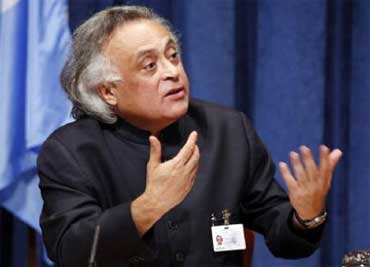 Even as UN climate talks in Cancun were almost deadlocked over contentious issues like a legally binding pact on emissions cut, India on Thursday sought an 'EverGreen Revolution' that will trigger innovations in low-carbon technologies tailored to withstand global warming.
Even as UN climate talks in Cancun were almost deadlocked over contentious issues like a legally binding pact on emissions cut, India on Thursday sought an 'EverGreen Revolution' that will trigger innovations in low-carbon technologies tailored to withstand global warming.
"The time is now for us to launch an EverGreen Revolution from Mexico, a revolution that will trigger innovations in low-carbon technologies for energy, transport, agriculture and other areas," Environment Minister Jairam Ramesh said during the UN Conference of Parties.
Ramesh was of the view that such a revolution could be on the line of the Green Revolution in wheat launched from Mexico over 60 years ago, with the development of new high-yielding varieties at International Maize and Wheat Improvement Centre.
He maintained that the November 29 to December 10 Cancun meet must take a decision on establishing a Consultative Group on International Agricultural Research (CGIAR)-like network, of which CIMMYT is a part.
The minister also gave details about various domestic and voluntarily steps taken since post-Copenhagen conference to pro-actively respond to challenges of climate change.
He hoped that with such steps, India will not only be amongst the fastest growing economies in the world as measured by GDP -- Gross Domestic Product -- but will also be amongst the most responsible in ensuring a high rate of growth of the real GDP -- Green Domestic Product.
The statement comes amid efforts by India to ward off pressure from developed nations like Japan and some other rich countries, which are seeking legally binding greenhouse gas (GHG) emission reductions from the emerging economies.
Opposing the move, India had made it clear that there is no question of taking up legally binding commitment on carbon emission and it was doing its bit at the domestic level to check climate change impacts.
A pledge to reduce the emissions intensity of the country's GDP by 20-25 per cent by the year 2020 on a 2005 level, diversifying energy fuel mix, setting up of the target to establish 20,000 MW of solar power generating capacity by 2022 are some of the major steps being taken to move towards low-carbon path, Ramesh pointed out.
Moreover, Ramesh said the present share of nuclear power in the country's energy mix, which is 3 per cent, will be doubled over the next decade while a major market-based programme has been put in place to stimulate energy efficiency.
"India's Twelfth Five-Year Plan, to be launched on April 1, 2012, will have, as one of its key pillars, a low-carbon growth strategy. Detailed work on this has already begun and is available in the public domain keeping in view our deepest commitment to transparency and accountability," he said.
"Moreover, we have imposed a clean energy cess on coal for funding R&D of clean energy technologies, even though coal will continue to play a key role in our future energy strategy. We have aggressively expanded the use of natural gas in our power production," the minister elaborated.
On forestry and coastal management, he said India is launching an ambitious 'Green India Mission' to increase the forest cover in 10 million hectares of land while adaptation steps are being taken in the coastal region.
Image: Environment Minister Jairam Ramesh. Photograph: Reuters











 © 2025
© 2025